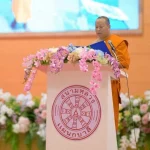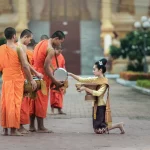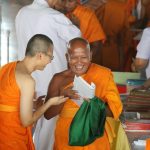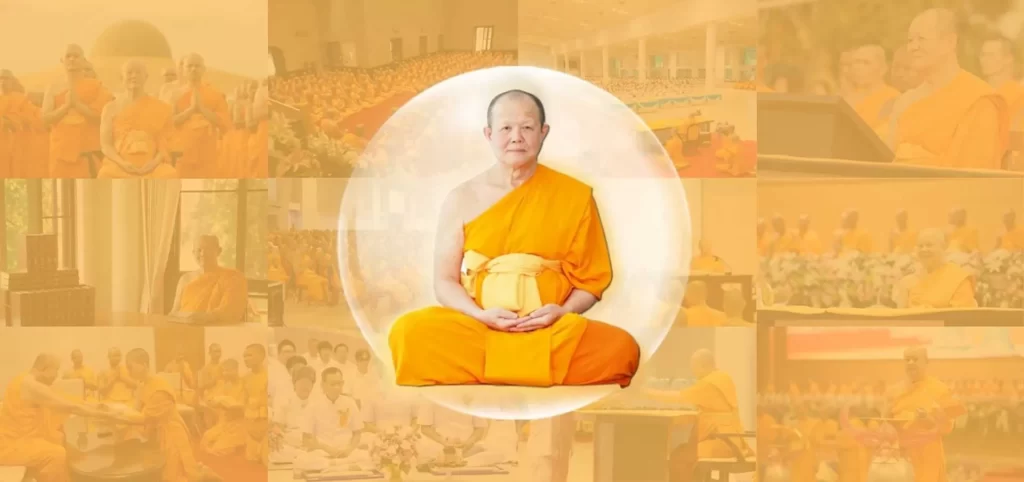
Luangpor Dattajeewo
A teacher to all of us
“Phadet…make sure you take good care of yourself. In the future, wherever your name goes Buddhism will be known there as well.”
It is not certain how the late renowned meditation master Luangpor Boontham of Wat Khao Laem in Kanchanaburi province made this prediction. It might have been Phadet’s destiny, or the strong determination of a charismatic young man dedicated to practicing meditation and with an insatiable appetite for learning. Luangpor Boontham made the prediction a few years before his passing.
More than 60 years have since passed, along with all the Perfections and merits accumulated, and that bright 17-year-old young man has evolved into the most venerable Buddhist monk at 80. The name and reputation of Most Venerable Phadet Dattajeewo of Wat Phra Dhammakaya is well-known in many places as it was foretold.
Luangpor Dattajeewo has enlightened and shown the path to peace for so many people he met on numerous visits to many countries around the world.
Throughout the years, he has worked tirelessly. And although the work was sometimes grueling and laden with obstacles, the words “I cannot do it anymore” have never once passed his lips during his long tenure.
Luangpor Dattajeewo believes that the pursuers of the Ten Perfections (Pāramitā) must not have reservations but have perseverance when facing challenges. Hence, he invests his time and energy toward the accumulation of Perfections with utmost determination. He diligently trains himself according to the Buddhist teachings and the monastic code of discipline while teaching and enlightening others. He devotes himself to building a true temple, ordaining true monks, teaching laypeople, and cultivating peace in the world.
“Dattajeewo” means one who devotes himself to Buddhism.
This is the unwavering determination of Luangpor Dattajeewo or “Khun Krumaiyai”—an exemplary role model for anyone pursuing the Perfections.
The path on the pursuit of the Perfections
Luangpor Dattajeewo was born on Saturday, 21 December 1940 to Sune and Huay Pongsawat—an agricultural family in Kanchanaburi province.
Sune Pongsawat was a hardworking man of vision as compared to his fellow farmers and demanded excellence from all his children in both their studies and conduct as citizens of society. When Phadet was young, he immersed himself in learning every subject and practicing meditation. His appetite for reading was so immense that he practically read every book in the local library while in secondary school at Visuttharangsi.
Books that drew his greatest interest were on meditation, and a particular one that piqued his attention immensely is an ancient text called Visudhimagga by Ven. Phraputakosajarn. Once he finished it, he was inspired to practice meditation. However, it proved difficult to achieve good results when you practiced on your own. Thus, he went on a personal quest to find a meditation teacher. And by sheer luck, he came across an instructor who was practicing meditation in order to advance his black magic, drawing Phadet’s interest to techniques such as immortality, heat resistance, and unlocking locks using magic. At that time, Phadet was unaware that this form of black magic belonged to the Dark Art and heedlessly assumed it was part of the Wholesome Art.
Two things that Phadet had always been intrigued about were heaven and hell. Even having learned many techniques that gave him special abilities, he could not quell his curiosity about heaven and hell. He continued searching for someone knowledgeable of this subject. Whenever he had time, he would trek into the forest or mountain to practice meditation with various renowned masters. And when an opportunity arose, he would always ask about heaven and hell and celestial beings. No matter whom he asked, no one, be it a monk or a lay person, could offer a clear, credible answer. Some teachers insisted that heaven and hell and celestial beings existed. But when inquired further, they revealed that they only learned or read about it in the Tipitaka. Up until that point, there was no teacher who could confidently declare that he had seen or visited heaven or hell.
Since he had not discovered the wholesome art, he, an inquisitive teenager, was still lost in black magic. Phadet graduated from Triam Udom Suksa High School and entered Kasetsart University to study agriculture in 1960.
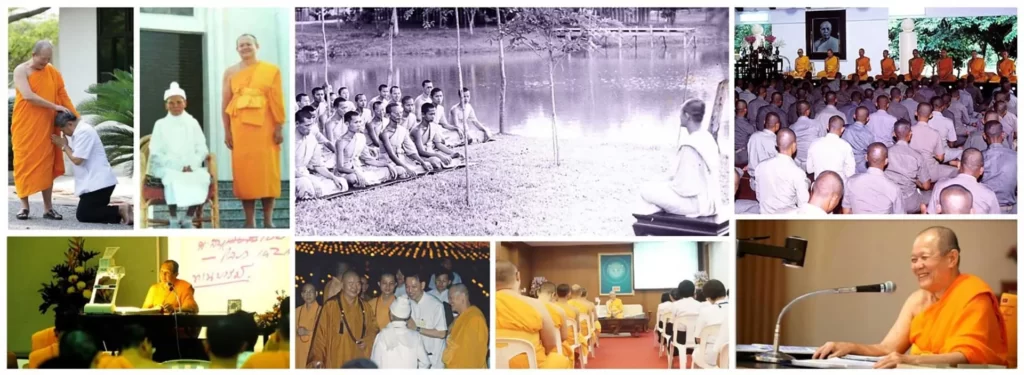
Meeting a true and virtuous friend
Luckily, the positive consequences from his past good deeds fruited in time before he became further misguided in black magic. Upon completing a program in Australia, Phadet returned to Thailand to finish his bachelor’s degree in animal husbandry at Kasetsart University. As a senior, he finally met Luangpor Dhammajayo who was a junior. It was a chance meeting that he would never forget.
The date was Sunday, 27 November 1966—Loy Krathong day. That night with a bottle of liquor in his hand, he intended to have drinks with a bunch of lower classmen. Everyone gladly accepted the alcohol except for a junior who declined because he was observing the Buddhist Precepts. The answer struck Phadet profoundly and caused him to reflect back to a time when he, too, observed the Precepts. Deep down inside, he sensed something remarkable about this junior student. However, Phadet got drunk that night and failed to get the junior’s name and couldn’t recall his face.
The next day after sobering up, he went looking for the junior who turned down alcohol because he was keeping the Precepts. He eventually found him and learned his name was Chaiyaboon Suddhipol. After getting to know Chaiyaboon, he liked him immediately and wanted to recruit him to learn black magic. However, before sharing his knowledge, he needed to assess Chaiyaboon’s conscience and knowledge in Buddhism. He began with some basic questions and progressed to more challenging ones. Whatever questions were thrown at him, Chaiyaboon was able to answer them effortlessly. With a vast knowledge of the Tipitaka from extensively reading it, Phadet kept slinging deeper and more difficult questions in hopes that Chaiyaboon would fail to answer one. The interrogation went on for a few days and was so intense that both fell ill from exhaustion afterwards. Since Chaiyaboon satisfactorily answered the questions posed, Phadet began to doubt if he could possibly be a mentor to Chaiyaboon who clearly demonstrated greater knowledge of the Tipitaka than him.
Phadet’s final questions pertained to heaven and hell. If Chaiyaboon answered with any ambiguity or gave empty answers like the past teachers, Phadet would not request to be his pupil but would still regard him highly. Chaiyaboon stated unequivocally that heaven and hell exist, and the person who could verify their existence was still alive. This person was none other than Khun Yai—Master Nun Chand Khonnokyoong, a nun at Wat Paknam Bhasicharoen.
Chaiyaboon insisted that they were real. If Phadet wanted to see heaven and hell, Khun Yai could teach him the way as well.
He warmly accepted the wisdom and depth of knowledge possessed by this younger student. Although Chaiyaboon was merely a junior, Phadet treated and respected him like his teacher. This was no small matter for students at Kasetsart University at that time since seniority was one of the active and established traditions. When he was with Chaiyaboon, he made sure to sit or sleep in a position lower than Chaiyaboon as a demonstration of respect.
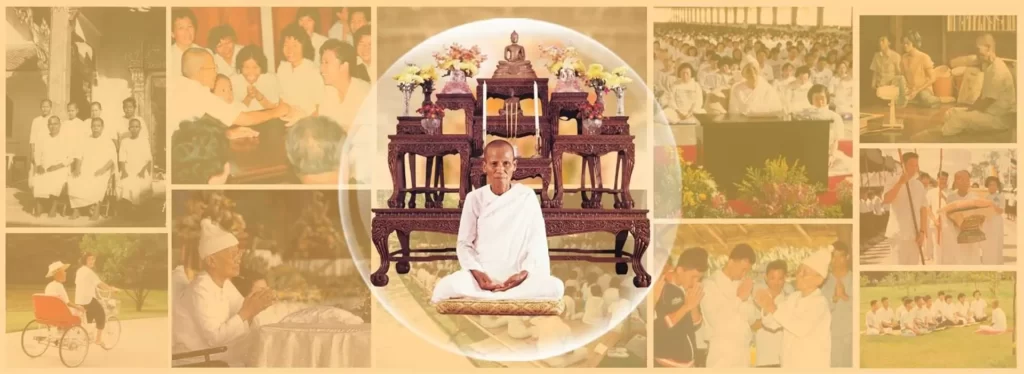
Meeting Khun Yai Master Nun Chand
Chaiyaboon’s confirmation that Khun Yai had direct knowledge and could see the heaven and hell realms, and that she would be happy to teach him made Phadet ecstatic. However, there was work to be done before his first meeting with Khun Yai. Khun Yai was a nun in her golden years who appreciates peace and serenity and shied away from people with loud personalities. Chaiyaboon held Phadet back three months to allow him time to prepare. Chaiyaboon taught him basic meditation as well as good manners.
Once Phadet met Khun Yai, he felt an instant connection and was thoroughly convinced that Khun Yai was someone he knew from the past. In that moment of excitement, he forgot his preparation and asked Khun Yai bluntly: “Khun Yai, Chaiyaboon tells me that you can take someone to visit heaven and hell. Is that true?”
“Yes. I went there to help my father escape from the hell realm.”
Immediately after receiving such a direct and definitive answer, he told himself that he had found the genuine teacher he had been searching for so long. Deep respect and faith rushed over him that nothing could refrain him from asking further.
“Would someone like me possibly be able to go see it as well?”
“Of course. The fact that you are here indicates that you already possess tremendous merit. For a person like you, it wouldn’t take long at all,” Khun Yai assured.
From that day on, Phadet devoted himself to Khun Yai. He was willing to commit his life to her unconditionally so that she could instill and cultivate good habits in him. He believed he must have been under her tutelage for countless lifetimes.
At the beginning when he started practicing meditation with Khun Yai, he had to persevere and overcome some physical challenges. Shortly after sitting down for meditation, he would experience shortness of breath and extreme discomfort. Khun Yai alleviated these physical discomforts by revealing to him the cause behind his symptoms.
“In the past, you practiced black magic extensively. Your former teachers of the Dark Art did not want you to leave your path and were trying to impede you.”
Since Phadet was determined, devoted to what he believed, and considerate of others, his meditation skill continually progressed. Soon he was delegated the role of teaching assistant to those who came to learn meditation at the Dhammaprasith House in Wat Paknam Temple. The reason why Khun Yai assigned Phadet this important responsibility was later revealed by Luangpor Dhammajayo.
“Khun Yai pointed out that Phadet was humble, cordial, smart in finding a job, and a grateful young man. He did not get annoyed whenever she tried to teach him. He was an honest person and had the ability to teach others.”
In 1969 after Chaiyaboon renounced the secular life and ordained as a Buddhist monk in order to devote his life to Buddhism, Khun Yai knew that it was time to build a new temple to be the center in spreading the Buddha’s teachings. This important endeavor was entrusted upon her by the Great Master Phramongkolthepmuni (Sodh Candasaro) before he passed away. Khun Yai led her students at the Dhammaprasith House in meditation and in making an earnest wish for a land for the new temple. Not long after that, towards the end of 1969, her prayer was answered. Lady Prayad Pattayapongsavisuttatibodi generously donated a 196-rai plot of land in Pathum Thani province. Once they received the land in 1970, construction of the new temple began immediately.
At that time, Phadet was earning a good salary as a managing director of the sales department for a private company, but he resigned in order to devote himself full time to the temple construction. It was an enormous sacrifice to walk away from such a high paying job. Without a financial safety net from that job, Phadet risked his future by taking on the new duty at the new temple.
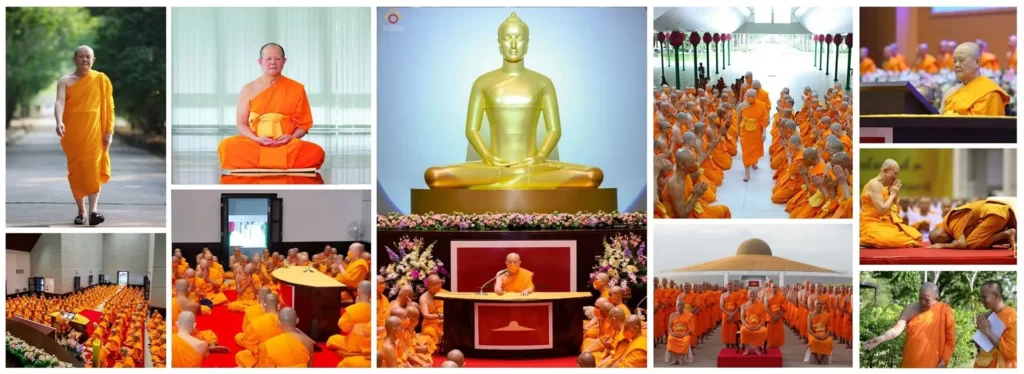
Monkhood
In the early part of 1970, Phadet pledged to ordain as a monk and to remain celibate for the rest of his life. But with all his time and effort devoted to the construction of Wat Phra Dhammakaya, there was little time to focus on ordination. Concerned that the integrity of his vow to ordain would be compromised, Khun Yai had a candid talk to kindly remind him.
“Phadet, the secular life is not suited for you because you are too generous a person that you would willingly give all your fortune away. And family life is not an easy one either,” Khun Yai added.
“You were born only to pursue the Perfections. You will achieve success in everything you do once you’re ordained. You have shown perseverance and have a chance to attain Dhammakaya, so you should ordain. I will set the date for you.”
Phadet was ordained as a Buddhist monk at Wat Paknam Bhasicharoen on 19 December 1971 with H.H. Somdej Phra Maharatchamongkhalachan (formerly Venerable Phrathepwarawati), the current abbot of Wat Paknam Bhasicharoen, as his ordination preceptor. He was given the monastic title of Dattajeewo Bhikkhu.
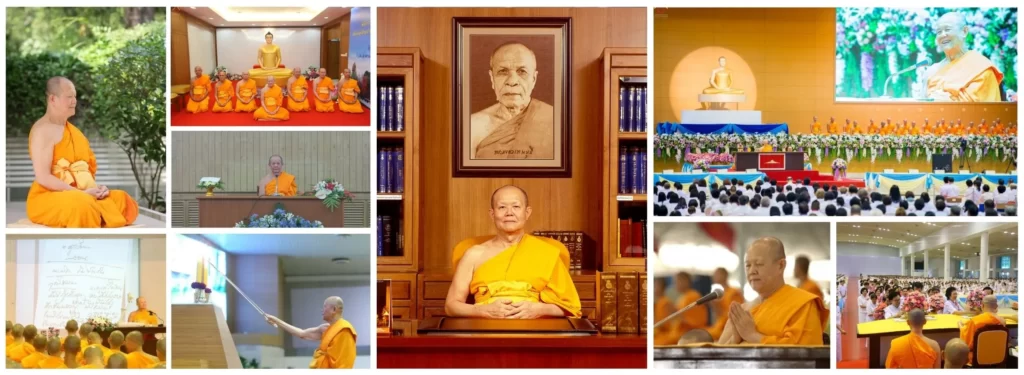
Role model for a great teacher
Luangpor Dattajeewo’s life in the monkhood, from his first year to the present and 50th years, has been devoted completely to Buddhism. Besides practicing and adhering to the Vinaya (Monastic code of discipline), he has worked assiduously toward the aspirations that the temple was founded upon: building a true temple, training true monks, and cultivating virtuous people. Luangpor Dhammajayo delegated him the important task of overseeing the education and training of the monks, novice monks, lay personnel, and temple supporters.
Since he is intellectually curious, observant, analytical, and sensible, he holds a vast knowledge in countless fields, for example, the Vinaya, history, geography, administration, construction, health. Thus, his disciples, both monks and laypeople, all extolled him as “Luangpor Dattajeewo, our great teacher.”
The statement genuinely describes who he is since teaching is what he loves most, is dedicated to, and fully excels in. His wisdom talks are praised for being clear, concise, profound, and precious. His manners and speech are graceful. He is an exemplary role model for his students because he truly teaches and he truly leads.
In addition to devoting himself to meditation and the four principles of a virtuous existence (loving-kindness, compassion, altruistic joy, and equanimity), he always has utmost gratitude for his teachers by following their teaching and instructions. Any task his teachers request, he would see to it that it is perfectly executed. With a great sense of responsibility for the temple, he works tirelessly to make sure the temple work is completed whether they are big or small. He would never sit idle but would get involved to ensure that the job is completed. He is one of the main forces behind the temple construction and the spreading of the Buddha’s teaching.
It could be said that besides Master Nun Chand Khonnokyoong and Luangpor Dhammajayo, Luangpor Dattajeewo is the other driving force that has made the temple what it is today.
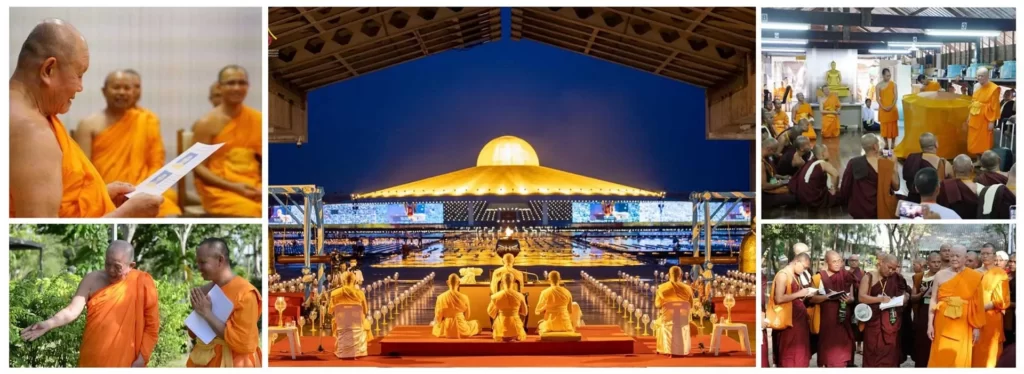
Most Venerable Phadet Dattajeewo
- Current titles : Vice Abbot of Wat Phra Dhammakaya
- President of the Dhammakaya International Society of North America and Europe
- Date of birth : 21 December 1940
- Bachelor of Science in Agriculture and Animal Husbandry from Kasetsart University, Bangkhen Campus
- Diploma of Dairy Technology, Hawkesbury College, Australia
- Ordained on 19 December 1971 at Wat Paknam Bhasicharoen, Bangkok

